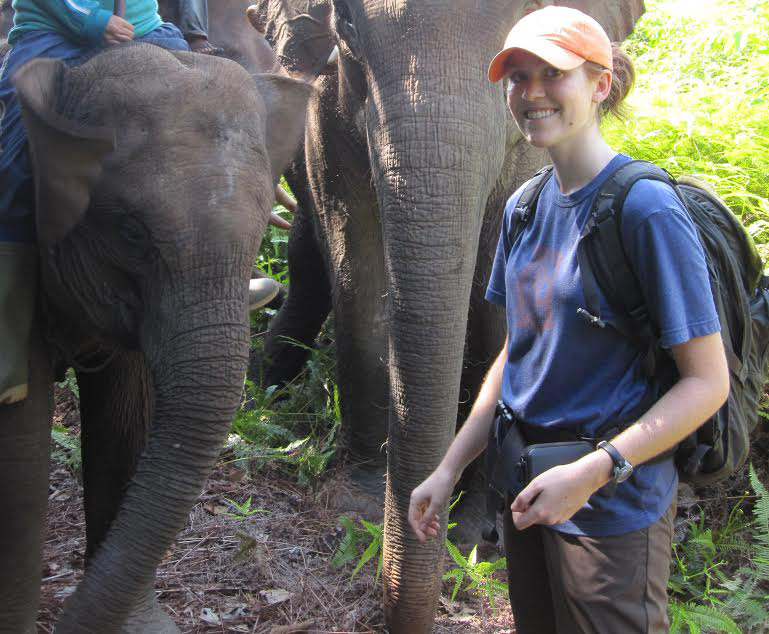Erin Poor receives Fulbright grant to study endangered Sumatran tigers

Erin Poor of East Lansing, Michigan, a doctoral student studying fish and wildlife conservation and geospatial environmental analysis in Virginia Tech’s College of Natural Resources and Environment, has been awarded a Fulbright U.S. Student Program grant to study how fine-scale habitat use and landscape connectivity affect the endangered Sumatran tiger.
Poor is one of three Virginia Tech students to receive a 2014 Fulbright award. Lindsey Rich, a fish and wildlife conservation doctoral student in the College of Natural Resources and Environment, and Kathryn Fiedler, a postdoctoral student who earned her doctorate in plant pathology, physiology, and weed science from the College of Agriculture and Life Sciences in May 2014, each received Fulbright U.S. Student Program grants.
A critical component of Poor’s Fulbright work will be an intensive, three-month language study on the island of Java, which will enable her to be conservational in Indonesian, helping to bridge difficulties of being a westerner in rural Sumatra.
“If you even attempt to speak Indonesian, people are grateful and amazed you’re trying,” said Poor. “Being able to speak the language will definitely give me a leg up.”
In addition, the Fulbright award will help as she applies for research permits, eliminating the possibility of a one- to two-year wait and allowing her to stay in the country for 10 months to conduct her research.
Poor’s research will take place in the Sumatran province of Riau, where mixed-use corridors connect three protected areas of tiger habitat. A crucial aspect of Sumatran tiger conservation is to determine whether tigers are travelling between the protected zones and interbreeding with neighboring populations.
“If populations become isolated it can lead to inbreeding depression, susceptibility to disease, low population numbers, and even extinction,” she explained.
Mixed-use corridors are made up of forests, settlements, and various plantations, including oil palm plantations. Indonesia is the world’s largest producer and consumer of palm oil, a vegetable oil used in many foods. Interactions with tigers in these areas are often negative, leaving an open door for Poor to include an educational aspect to her stay.
“Many locals aren’t aware of the danger, and possibly not aware of the low population numbers of tigers,” remarked Poor. “They see them as a nuisance.”
“World Wildlife Fund has created a new environmental education nature center in one of the protected areas,” she continued. “I’m hoping to work with Indonesian undergraduate and master’s students from the University of Gadjah Mada to train them on how to collect tiger scat and use it for genetic analysis, and to help me conduct outreach with local residents.”
Tiger scat is one of the keys to her research methods. By collecting small DNA samples from tiger scat, or droppings, Poor can document a wide array of diversity information — from determining population numbers to whether or not the tigers are successfully interbreeding.
She also plans to employ a remote sensing component to study habitat connectivity and change over time within habitats given different human development scenarios, as well as potentially collaring tigers to observe their specific movements and activities within the multi-use corridors.
“One of our goals is to figure out why and how tigers are using palm oil plantations and to use that information to influence plantation management, decrease conflicts between humans and tigers, and increase local awareness about the tigers,” Poor concluded. “Hopefully we can get the tigers to sustainable numbers so we don’t have to worry about extinction.”
“I foresee Erin’s project as extremely important to our understanding of how tigers navigate a multi-use landscape, something we know very little about,” said Associate Professor Marcella Kelly, Poor’s advisor. “The study also will have important implications for addressing human-tiger conflict as we learn how tigers move through, or even use, human-modified areas.”
Poor earned her bachelor’s degree from the University of Pittsburgh and her master’s from Duke University. While working as a geospatial information system analyst for World Wildlife Fund’s Tigers Alive initiative in Washington, D.C., she met Sunarto, a tiger expert for WWF–Indonesia. Sunarto, who earned his doctorate from Virginia Tech in 2011 and was also advised by Kelly, “has been a great and helpful bridge between Virginia Tech and WWF–Indonesia,” said Poor, adding that he has helped her with logistics and designing her field study.




